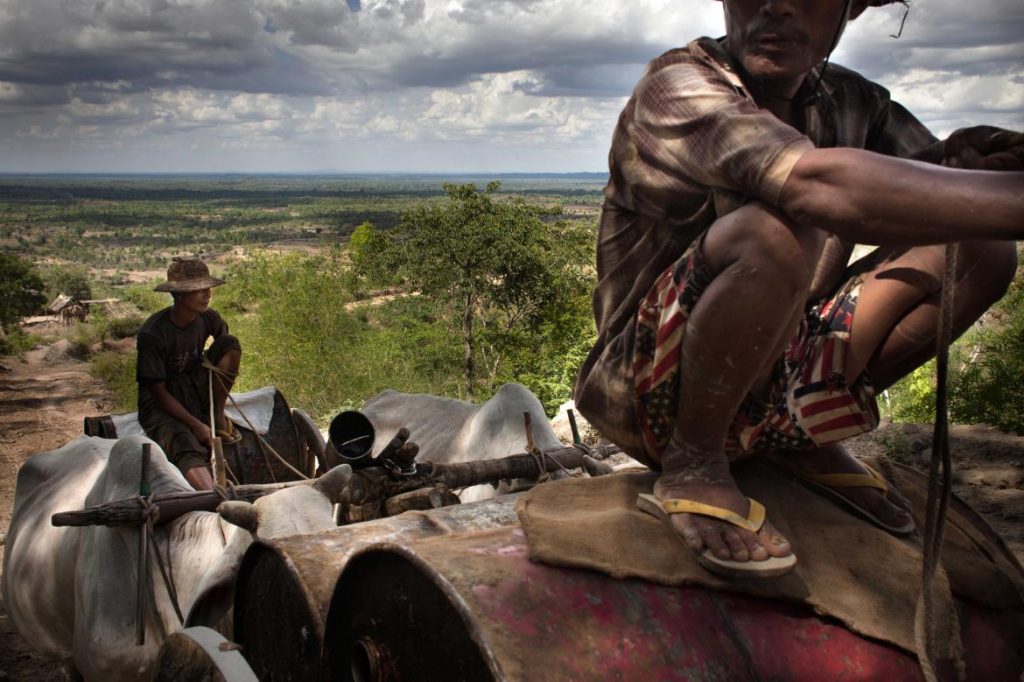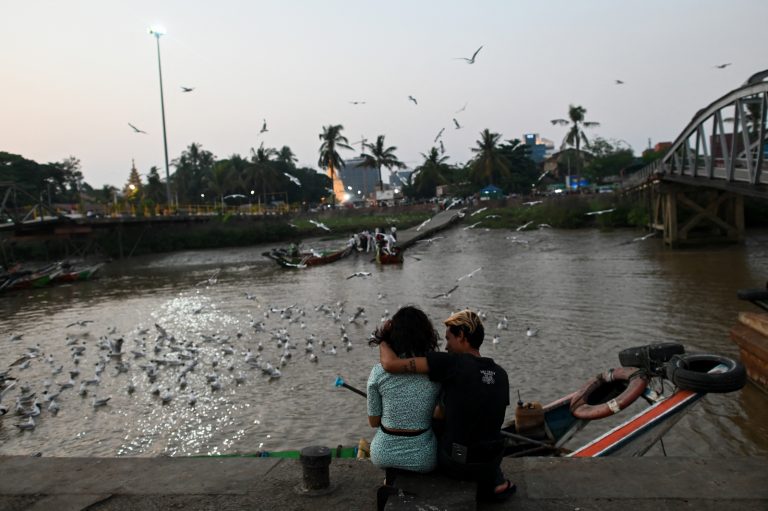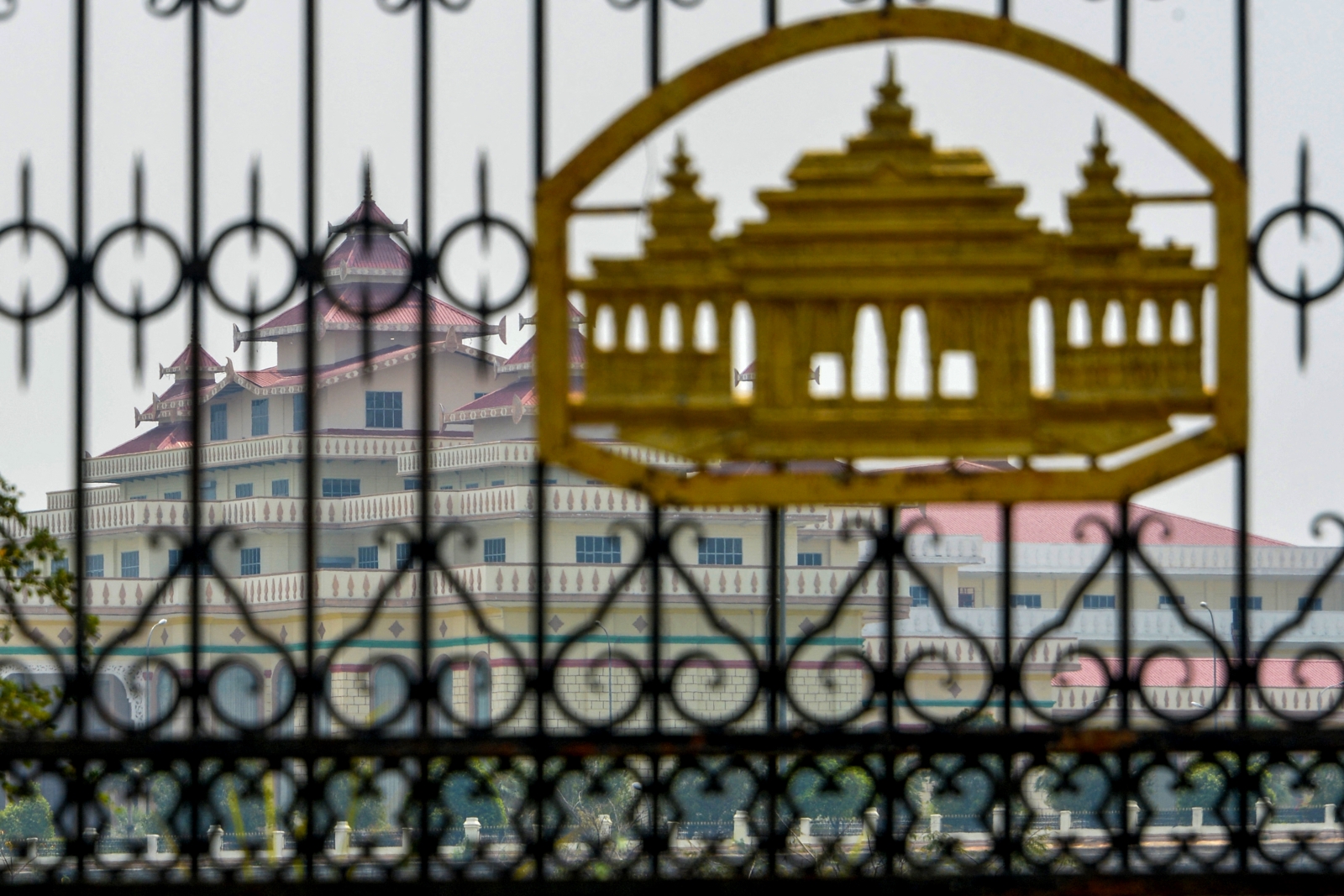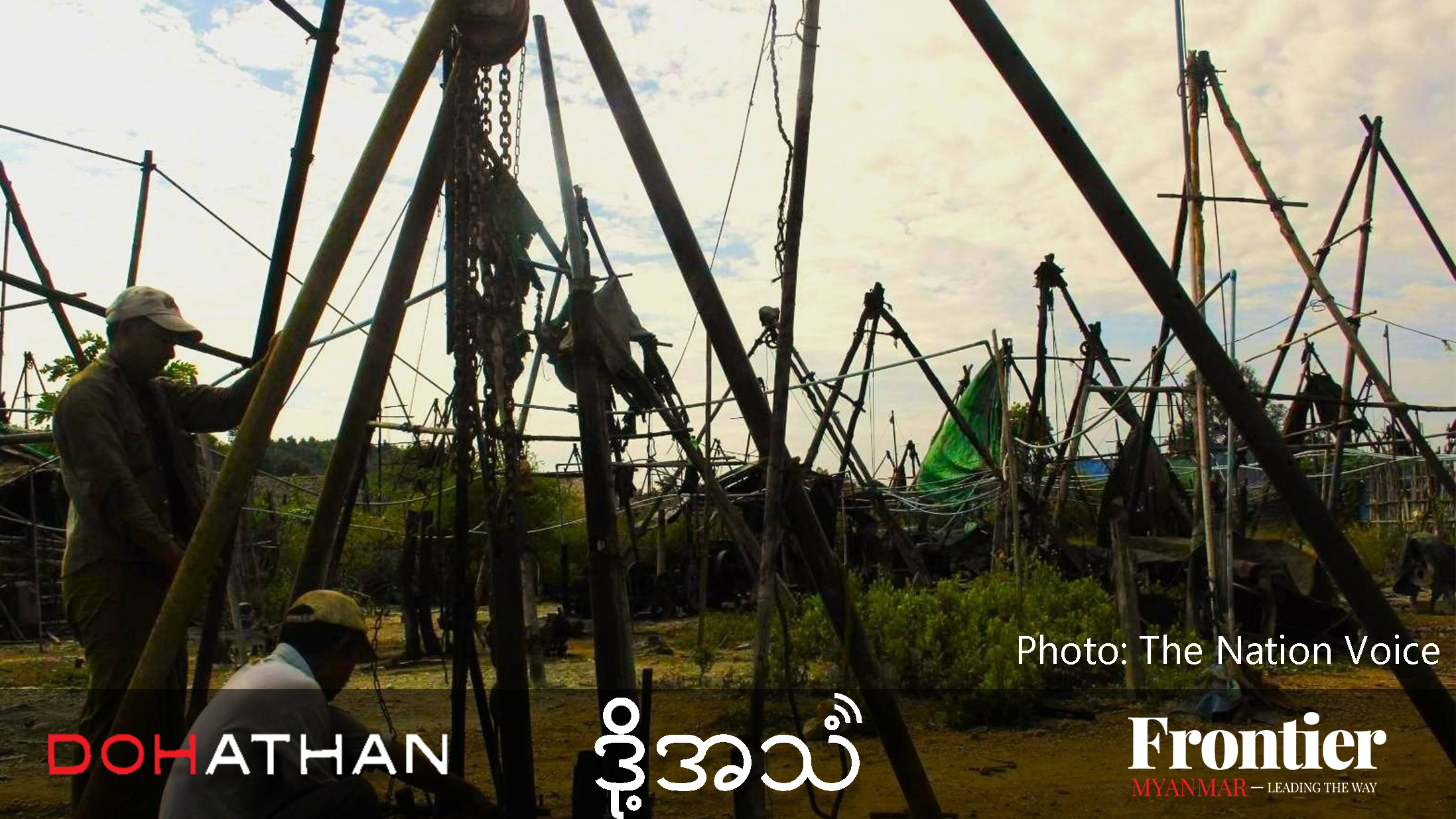Frontier digs deeper into the K7.5 billion oil tax scandal in Magway Region involving the former chief minister and finds murky business links, conflicted lawmakers and a government putting political expediency above the rule of law.
By HTUN KHAING | FRONTIER
AMID THE parched landscape of Magway Region in Myanmar’s central dry zone, thousands of artisan miners toil in harsh conditions to extract oil from some of the nation’s oldest producing fields.
The fruit of their labour generated a bountiful tax harvest for Magway’s previous Union Solidarity and Development Party government.
In recent months, the rich pickings from the tax – on the cost of transporting the oil to the nearest refineries in Mandalay and Sagaing regions – have also been generating unwelcome headlines for the USDP after an investigation found that K7.549 billion (about US$5.45 million at current exchange rates) was missing from government coffers, and at least some had been misappropriated.
The investigation, conducted by the Bureau of Special Investigation, an agency of the Ministry of Home Affairs, found that K1.7 billion went to a Magway Region development fund linked to former Magway chief minister U Phone Maw Shwe, and K1.57 billion to a microfinance institution, Shwe Thukha.
Support more independent journalism like this. Sign up to be a Frontier member.
It also found that funds were used to “donate” four cars, a backhoe and two boats to the USDP.
Phone Maw Shwe has returned the five vehicles and two boats to the regional government and repaid about a quarter of the K3.27 billion.
An investigation is continuing into the remaining sum – more than K4 billion – which was ostensibly used for “local development projects”.
Oil industry sources say they paid a tax to the regional government typically ranging from K1,650 to K3,300 a barrel. The size of the tax, which apparently went into the regional budget, was negotiated annually, they told Frontier.
But they were also forced to pay a flat K3,000-per-barrel transportation tax, which was for regional development work. It is the whereabouts of this money – thought to total K7.549 billion – that the BSI investigation focused on.
If all of the funds raised from the tax had been spent on development they could have helped to raise living standards in Magway, which is one of the country’s poorest states and regions. The 2014 census found that 77 percent of the regional population lives without electricity and about half the people rely on horses or oxen for transport.
The USDP regional government was routed in the November 2015 elections, losing all 47 of the seats it held in the 68-member hluttaw. The National League for Democracy won all 51 elected seats, including four previously held by the National Unity Party.
The stench of corruption may have contributed to the NLD’s crushing victory in Magway. Shortly after the election, the party began receiving anonymous tip-offs about oil tax funds accumulated by the previous government.
But when information about regional revenue sources was transferred to the incoming NLD government during the transition period after the election, there was no mention of oil tax funds.
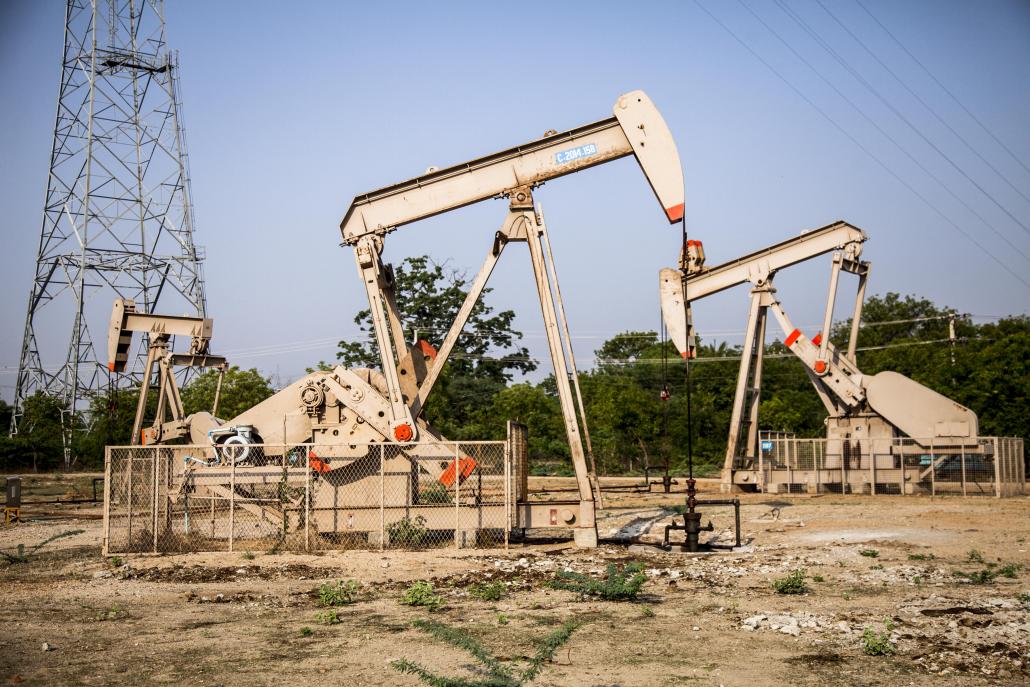
Derricks pump oil in Magway. An investigation has found that K7.549 billion in oil taxation revenue from the fields is missing from government coffers. (Theint Mon Soe aka J | Frontier)
After the change of power, a Pyithu Hluttaw MP, U Tun Tun (NLD, Pwintbyu), began asking questions about missing funds after oil mining sources in Myaing and Minhla townships told him they had paid transport taxes and contributions to the development fund in previous years.
“When I asked the regional government, I learned that it had not received the funds,” Tun Tun told Frontier.
Initially he believed that K2.8 billion should have been left for the incoming administration, and he mentioned this sum when asking a question about its fate in the Pyithu Hluttaw on May 31 last year.
The question was answered by the Minister for Electricity and Energy, U Pe Zin Tun. The minister said that not only had the Union government not received the money levied on oil traders, it had no information at all about the tax.
He mentioned Phone Maw Shwe by name. The former chief minister has become inseparable from allegations over the misappropriated funds.
Who is Phone Maw Shwe?
Before he became chief minister of Magway, Phone Maw Shwe was a Tatmadaw colonel and regional commander for several years.
He is said to have played a role in ordering the brutal suppression of demonstrating monks in Pakokku in September 2007 that was one of the main triggers of the protest movement that became known as the Saffron Revolution.
The regional commander role came with political and administrative responsibilities. Concurrently, he was chairman of the Magway Division Peace and Development Council under the military junta. He was also active in the Union Solidarity and Development Association, the mass organisation that the military created and then transformed into the USDP.
Phone Maw Shwe retired from the Tatmadaw ahead of the rigged 2010 elections and contested the regional seat of Minbu-1, defeating a rival from the NUP and paving the way for his appointment as Magway’s chief minister.
The USDP government under President U Thein Sein surprised Myanmar and the world by introducing a series of reforms after the transfer of power from the junta in March 2011, but they had little impact in Magway, mainly because of resistance from Phone Maw Shwe.
During his term as chief minister, he consolidated his reputation as a hardliner who ordered harsh crackdowns on activists and shunned the media.
“During the Phone Maw Shwe era, journalists couldn’t even get permission to enter the regional parliament. Government officials never welcomed journalists. Now you can easily meet cabinet members,” said journalist U Myint Zaw Oo, who serves as general secretary of the Myanmar Journalist Network branch in Magway.
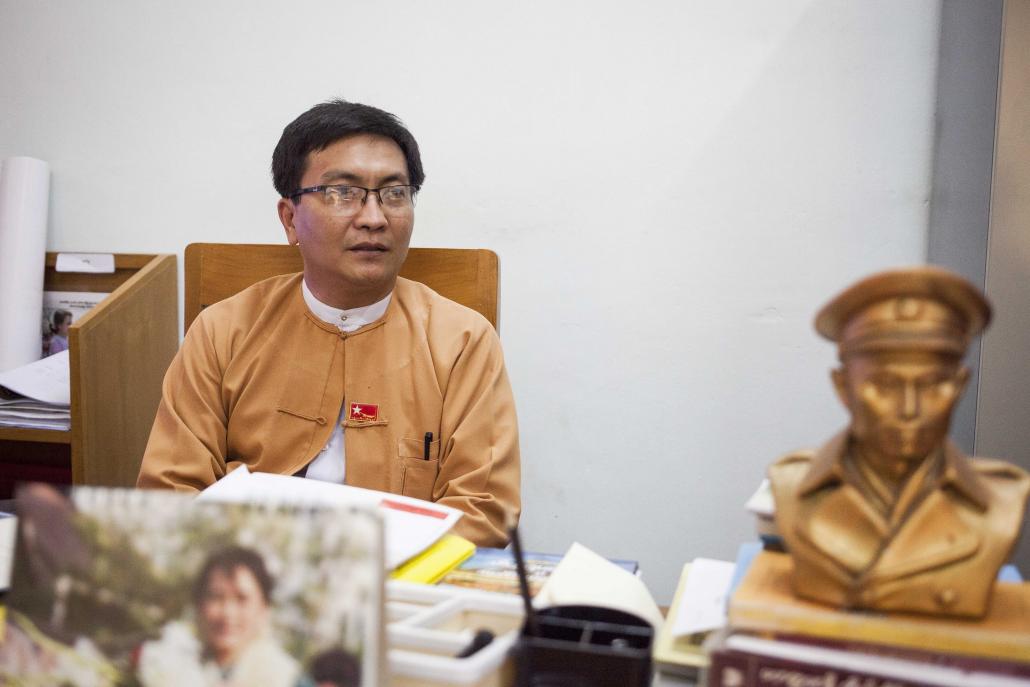
Magway Region Minister for Labour, Immigration and Population U Nay Myo Kyaw speaks to Frontier in his office on April 28. (Theint Mon Soe aka J | Frontier)
During his time as regional commander and chief minister, Phone Maw Shwe also developed a patronage network with some local companies. One of the more notorious beneficiaries was Koung Mon, a company owned by U Sein Htay.
When Phone Maw Shwe took charge in Magway, Koung Mon was a local bakery. By the time he finally left office, it had become a conglomerate, with interests ranging from shopping centres, hospitals and coffee to purified drinking water, a highway bus line and construction. And, of course, a bakery.
The widely held perception among residents in Magway was that Phone Maw Shwe was a silent partner in Koung Mon. They would often joke that the road frontage of the company’s department store in downtown Magway was the best-maintained stretch of tarmac in the entire region.
But in 2015, Phone Maw Shwe’s time in charge of Magway was drawing to an end. In the general election, he stood for re-election in Minbu-1 but was trounced by the NLD’s U Kyaw Swan Yi.
After the election Phone Maw Shwe was replaced as the chair of the USDP in Magway by Dr Maung Maung Htay. The former chief minister was last seen at a USDP meeting in Magway in early August 2016. His whereabouts are unknown; it is not known if he is even still a member of the USDP.
In April, the new Magway Region Chief Minister, Dr Aung Moe Nyo, told reporters that Phone Maw Shwe might be in Magway, Nay Pyi Taw, Pyin Oo Lwin or Yangon – in short, they had no idea.
The money trail
The revelation that K7.459 billion – plus vehicles with an estimated value of K1 billion –received by the previous regional government was unaccounted for came after an investigation lasting months that involved dozens of interviews.
Of the beneficiaries of the funds, the most unusual is the regional development foundation that, according to information from the regional government based on the BSI probe, received K1.7 billion, or about 23 percent of the total amount.
The Magway government has alleged that the mysterious development foundation donated K1.7 billion to the USDP.
A concerted attempt by Frontier during a recent visit to Magway failed to locate the office of the “Magway regional development foundation” or uncover any information about its activities. Even regional government officials closely involved in the case say they do not know where the foundation was based or what its activities were.
However, chief minister Aung Moe Nyo revealed some details at a press conference in late April, including that the investigation had discovered that the foundation had apparently been dissolved.
According to Eleven Media, Aung Moe Nyo said on April 25 that Sein Htay of Koung Mon had applied to renew the foundation’s registration shortly after the 2015 election. In the application letter, he described himself as the chairman of the foundation.
BSI officials are said to have questioned Sein Htay during their investigation but this has not been confirmed.
Frontier made two attempts to interview Sein Htay at his office by telephone but they were unsuccessful. The person who answered the phone refused to transfer the call to the businessman.
Another prominent businessman in Magway, U Sein Lin, was also involved in the foundation’s board, according to a source in the oil production sector.
The source said he himself had been named among the foundation’s members; he only found out when he was contacted by BSI, he said.
“I never attended any meetings. I have no idea how the foundation operates or what its activities are,” the source said.
Sein Lin is also a director of Sein Chi Lin Mining, a Minbu Township-based firm involved in Magway’s lucrative but mostly unregulated coal mining sector.
On March 28, he and eight workers from Sein Chi Lin were sentenced to seven years’ imprisonment for illegal mining in Minbu Township. They had been arrested in June 2016 under the Myanmar Mines Law for allegedly producing a mineral without the necessary permit. The prosecution alleged that while the company had a mining permit, it had conducted activities outside the permitted area.
Shortly before the verdict was handed down, local media reported that as many as 400 people – mostly miners who had worked for Sein Chi Lin but were now jobless – had staged a protest against their prosecution, which they said was unfair. Sein Lin’s wife, also a director of Sein Chi Lin, alleged to journalists that the regional government had pressured the court to find the defendants guilty.
Journalists in Magway who have covered the case closely said the criminal case was the result of the changeover from the USDP to NLD regional government. Under Phone Maw Shwe, local NGOs and community groups had often lobbied in vain for action to be taken against coal mining companies that were breaking the law. However, these complaints were always ignored by the chief minister.
The NLD administration had promised to tackle the issue. In June 2016, Aung Moe Nyo told the regional Hluttaw that when his government started investigating the industry, he personally received a death threat with the warning that he should not touch coal mining businesses.
But the NLD is not without its own links to natural resource extraction in Magway. Another name that has been mentioned in connection with the missing oil funds case is a former auditor of the development foundation, Amyotha Hluttaw MP, U Hla San (NLD, Magway-1).
Hla San, 60, who also owns a construction materials business, Aye Gabar, had denied any involvement in the corruption scandal.
He initially refused to speak to Frontier when approached at his Magway office on April 29. However, when Frontier approached him again later in a nearby crowded teashop, he agreed to speak about the case.
In a calm, quiet tone, Hla San said he knew eight months ago that BSI was conducting an investigation into the oil funds but only found out he was listed as the foundation’s auditor when he got a call from BSI.
The BSI official asked Hla San to cooperate with their investigation and said the agency had permission from the Magway chief minister to interview him. However, Hla San said he refused to cooperate on the grounds they did not have permission from the Amyotha Hluttaw Speaker, Mahn Win Khaing Than.
“I replied to [the officer] that if you want to interview me or you think I might be involved, write a letter to the Amyotha Hluttaw,” Hla San said.
“I offered, if you come to my home, I will speak to you. But since then, they haven’t contacted me.”
Asked how he could have been listed as a member without his knowledge, Hla San said he was active in social work in Magway and some organisations in the town had in the past used his name without permission.
Hla San’s link to the foundation are indicative of his complicated past, during which he managed to cultivate links on both sides of the country’s political divide. On the one hand, he has previously supported some pro-democracy activities, including those conducted by the 88 Generation network, but he also ran a successful business and had ties to the former regional government.
On balance, though, he is perceived as having been closer to Phone Maw Shwe and the former government than the NLD. His selection as a candidate in the 2015 election – in favour of other, long-serving members – upset some NLD members who believed him tainted by this association and not having shown sufficiently loyal to the party.
“I’m a businessman so I try to have a good relationship with everyone,” Hla San told Frontier. “But I never got any special favours from Phone Maw Shwe, and in recent years my relationship with him was not very good.”
The NLD declined to comment on Hla San’s history as an NLD member or selection as a party candidate in the 2015 election. On his possible involvement in the missing money, U Win Htein told reporters that if Hla San was found to have committed an offence the party would not interfere.
The USDP link
But the NLD has fewer questions to answer than the USDP, which BSI says received K1.7 billion from the regional development foundation. When Frontier sought answers about the case from the USDP’s Magway Region office, though, it declined to answer.
USDP headquarters in Nay Pyi Taw has denied that the party has anything to do with the case and has dismissed as a “political attack” statements about the corruption allegations by the NLD.
The USDP never received any of the misappropriated money, it said in a statement.
Magway Region Minister of Labour, Immigration and Population, U Nay Myo Kyaw, has denied that case was attack on the USDP, saying that the regional government was only interesting in reclaiming missing funds so they could be used for the people’s benefit.
“This money doesn’t belong to U Phone Maw Shwe or the USDP,” Nay Myo Kyaw said.
As for the Shwe Thukha microfinance institution, which according to the investigation report received K1.57 billion and is still operating, its chair is the sometimes media-shy U Kyi Tun.
While the USDP headquarters insists it did not receive any of the missing money, Shwe Thukha is known throughout Magway for giving priority to USDP supporters when issuing loans.
“In some villages in Magway in which the USDP won in the election, it’s easy to be accepted for a loan,” said Myint Zaw Oo, the Magway-based journalist.
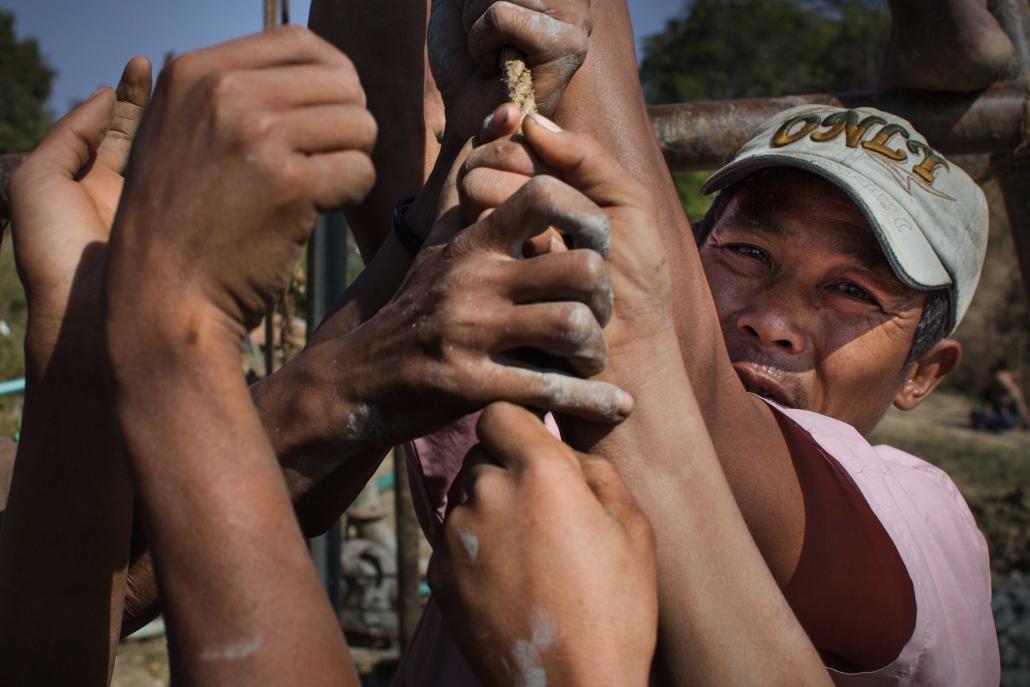
Oil workers in Magway. (Jeroen de Bakker | Frontier)
Several attempts by Frontier to contact Kyi Tun were unsuccessful.
However, a post on a Facebook page in the name of Kyi Tun on April 2 said allegations about misappropriated funds were rumours and a deliberate attempt to cause trouble.
About an hour later, a post on the same Facebook page suggested that he was being made a scapegoat for many others who were also involved in the scandal. “I’m being bullied because I’m the least powerful,” he said.
Nevertheless, Kyi Tun and Phone Maw Shwe promised in a letter to Magway Region Chief Minister Dr Aung Moe Nyo that the vehicles and K3.25 billion of the missing funds would be returned.
The letter said the vehicles would be returned in the last week of April and the K1.57 billion provided to the Shwe Thukha microfinance institution would be repaid by the last week of July, with an initial installment of K500 million in the first week of May.
The vehicles were returned on April 27. In the first week of May, Aung Moe Nyo told reporters in Magway that Kyi Tun had already repaid K800 million of the missing K3.27 billion to the regional government.
Political ramifications
The pledges of repayment and the return of vehicles and boats leaves a question mark over the K4 billion for “local development projects” that remains unaccounted for.
Nay Myo Kyaw said if the funds were used for local development, the regional government wanted to know the details.
“As the regional government, we are entitled to know,” he said.
Nay Myo Kyaw insisted that the recovery of missing funds was not about digging up the past to embarrass the USDP.
“It was not done based on hatred,” he said. “It is about a democratic government’s determination to ensure justice in a country that had long suffered many grievances.”
Questions have been raised about whether the government’s approach – to not prosecute those allegedly involved in the scandal if they repay the missing money – is the right one.
Critics argue that letting off those responsible sets makes a mockery of the rule of law and continues the politicisation of corruption investigations.
They point to the conspicuous absence of the Anti-Corruption Commission in the investigation. Instead, the commission has recently pursued another corruption case in Magway, against a township judge, Daw Inzali Mya Shein. Accused of taking about K1 million (barely .03 percent of the sum that Phone Maw Shwe has agreed to repay) from the families of plaintiffs in two separate cases last year, she fled once the investigation was made public in January.
There are also comparisons being made with the case of former minister for religious affairs U San Sint, who was given a 13-year prison term in 2014.
He was accused of misusing around $10,000 of state funds in late 2013 for a pagoda inauguration ceremony, but his real crime was to defy President U Thein Sein. San Sint’s offer to repay the funds was rejected and he was prosecuted to the full extent of the law.
One of San Sint’s supporters, former military captain U Nay Myo Zin – also a former political prisoner – said the constitution meant that the civilian government would find it difficult to prosecute someone that the military wanted to protect.
“It’s like the Burmese proverb: The bull [NLD] will be saved only if the tiger [the military] lets it live out of pity,” he said.
The Magway government refused to discuss the possibility of legal action. It is clear that this will be decided by political powerbrokers in Nay Pyi Taw; Aung Moe Nyo’s administration only sought to recover the missing funds after being instructed to do so by the Union government.
Even some who would have good reason for wanting to see Phone Maw Shwe prosecuted argue that it would not be in the country’s interests. Land rights activist U Aung Kyaw Kyaw – brother of the former monk U Gambira – was a leading organiser of the 2007 protests in Magway Region. Following Phone Maw Shwe’s crackdown, he was imprisoned in Taunggyi and Thayet before being released in a January 2012 amnesty.
He described Phone Maw Shwe as “the strongest hardliner from the military”. He wants to see the former chief minister apologise for the misappropriation of the oil revenue and pay it back, but believes that’s where the recriminations should end.
“I have heard some people criticising the NLD government because it’s just asking for the money back,” Aung Kyaw Kyaw said. “But a government needs to think very deeply about the country’s future. Behind U Phone Maw Shwe we can find the USDP and behind the USDP we can find military. This case may create new conflict between the democratic group and army-backed group.”
TOP PHOTO: Jeroen de Bakker | Frontier


